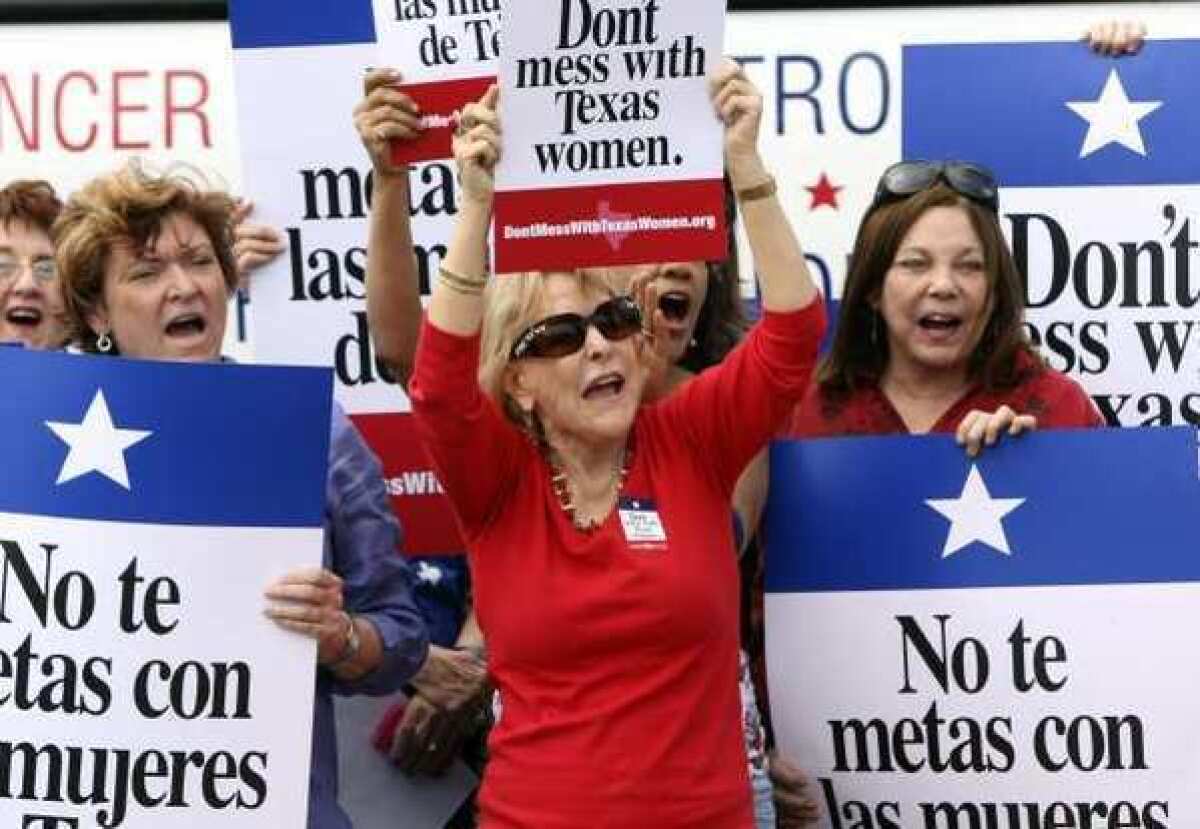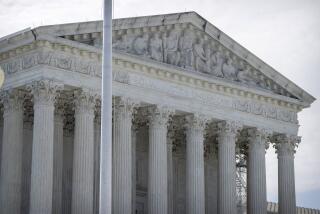Can Texas ban Planned Parenthood from women’s health program?

- Share via
HOUSTON -- A federal appeals court in New Orleans is expected to hear arguments Thursday over the legality of implementing a Texas rule that bans Planned Parenthoodclinics from a state and federally funded health program for uninsured, low-income women.
“What’s at stake is whether low-income women will be able to access healthcare services,” Melaney Linton, president and chief executive of Planned Parenthood Gulf Coast in Houston, told The Times. “It’s virtually impossible for other health centers to pick up the clients that were served under this program by Planned Parenthood.”
The TexasWomen’s HealthProgram last year had a budget of $41 million, about $13 million of it for Planned Parenthood clinics and about 90% of the money from the federal government. About half the 103,000 women served by the program in 2010, the most recent figures available, received at least some services through Planned Parenthood, a spokeswoman said.
“This program is a huge savings to the taxpayers of Texas” because of the federal matching funds, Linton said.
The state rule, passed in February by the Texas Health and Human Services Commission, bars groups affiliated with abortion providers from receiving money under the program, which provides services such as birth control and health screenings. The rule has been blocked by a court injunction.
At least four other states have attempted to exclude Planned Parenthood from federally funded Medicaid programs -- Indiana, Kansas, North Carolina and Wisconsin -- but those efforts have been blocked in court, Linton said. She said it was not clear what would happen if the Texas injunction was lifted and Planned Parenthood clinics lost funding.
“We’re not going to let politics interfere with the services we provide,” she said.
Stephanie Goodman, a spokeswoman for the Texas commission, told The Times that “ultimately, we must comply with the state law that bans abortion providers and affiliates from theWomen’s HealthProgram.”
“Prohibiting the state from enforcing that law puts the future of the program at risk. The federal authorization for the program expired at the end of March, so it’s already on borrowed time,” Goodman said.
She said the state would be able to continue the program if the injunction was lifted, noting, “We still have hundreds of doctors and clinics providing Women’s Health Program services even without Planned Parenthood.”
Gov. Rick Perry has supported banning Planned Parenthood from the program, and stood by that position this week.
“This is about life and the rule of law, which Texas respects and the Obama administration does not,” Perry spokeswoman Lucy Nashed told The Times.
“We are confident in our case before the court and in Atty. Gen. [Greg] Abbott’s appeal to defend the will of Texans and our state law,” she said. “As Gov. Perry has made clear, he will not stand by and let the Obama administration abandon more than 100,000 Texas women to advance its pro-abortion political agenda, which is why the governor directed the Texas Health and Human Services Commission to set up a state-funded program to provide access to the same services.... We’re confident the state program can effectively serve all qualified women.”
Clinics that provide abortions have long been barred from the program, but the new rule, which would have taken effect last month, also bans 49 Planned Parenthood clinics that don’t provide abortions from participating.
In April, Planned Parenthood affiliates that run the 49 clinics sued the state over the impending ban, claiming that the state rule violated the constitutional rights of the clinics and the women they serve. Last month, U.S. District Judge Lee Yeakel in Austin issued an injunction putting the new rule on hold while the court case progressed.
The Texas Health and Human Services Commission appealed, and another federal judge stayed the injunction. But a three-judge panel of the 5th Circuit Court of Appeals allowed the injunction to stand pending the hearing Thursday in New Orleans.
“The state has asked the 5th Circuit to reverse the preliminary injunction because the district court’s decision improperly prevents the state from implementing the Texas Legislature’s policy decisions,” Lauren Bean, a spokeswoman for the Texas attorney general’s office, told The Times.
It may take weeks for the court to issue a ruling. The case will then move back to Judge Yeakel in Austin for a hearing scheduled Oct. 19.
ALSO:
New Mexico posse gives chase -- after a dog
Tsunami debris: Huge dock lands on Oregon coast
Washington state same-sex marriage opponents file to block new law
More to Read
Sign up for Essential California
The most important California stories and recommendations in your inbox every morning.
You may occasionally receive promotional content from the Los Angeles Times.











